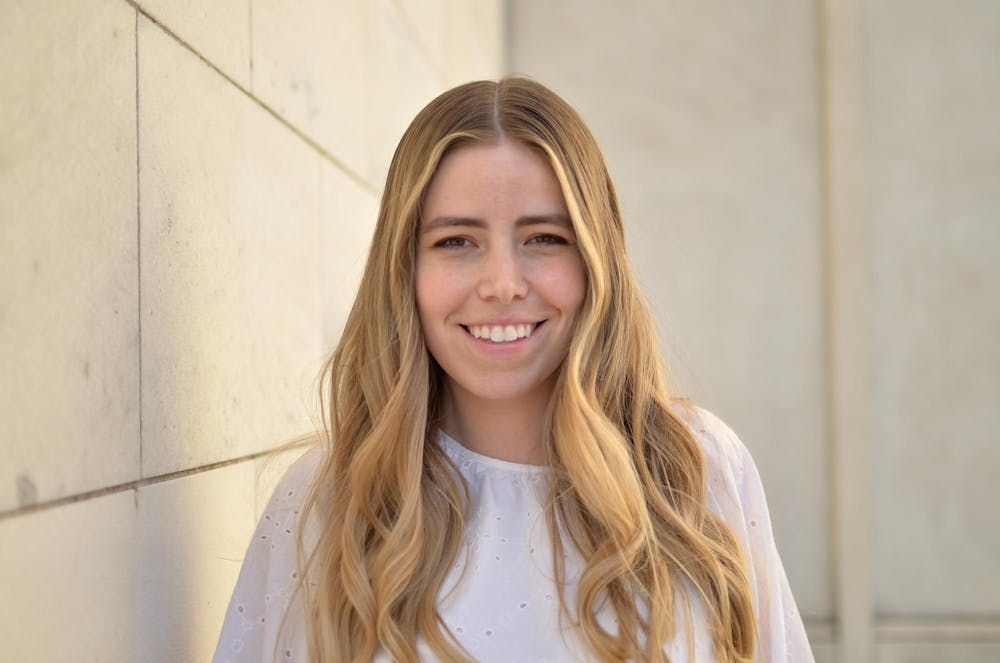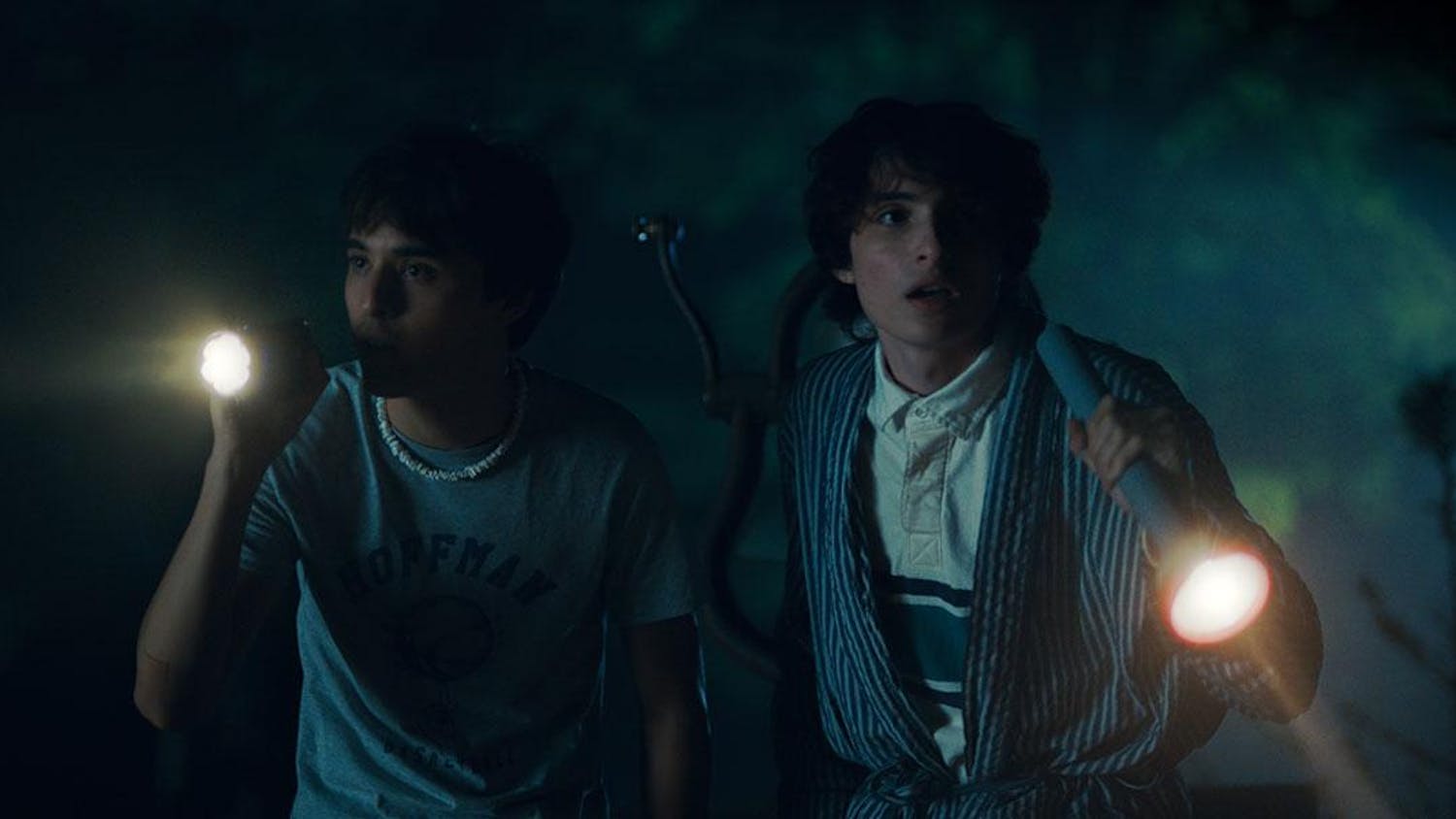Ten years ago, Maria Zoccola (15C) stood inside a small stone Orthodox church on the outskirts of Bratislava, Slovakia, listening to the shuffling feet of worshippers and the high-pitched ring of power tools from outside. While construction workers wielded their instruments, blanketed the glass windows with white sheets and spewed grey dust into the air, devotees continued their practice.
Unbothered by the whirl of machinery or the threat of falling debris, worshippers lit candles and prayed. Amid this clash of calm and chaos, Zoccola was on the “cusp of something” she could not yet grasp. She would capture this feeling a year and a half later while writing her poem, “saint somebody’s” (2022), which explores the juxtaposition between man-made mayhem and the peaceful promise of a divine presence. Zoccola’s religious exploration in Slovakia was not an isolated experience; the poet’s best work comes from exploring religion, mythology and self-discovery.
Zoccola, a Memphis, Tenn. native, graduated from Emory University in 2015 with a bachelor’s degree in English and creative writing. While Zoccola loved reading poetry throughout her adolescence, her primary passion was fiction writing. At Emory, Zoccola took a “bazillion” fiction writing courses and a few poetry workshops, including one taught by former U.S. Poet Laureate Natasha Trethewey.
During her undergraduate years at Emory, Zoccola studied abroad in New Zealand and traveled to Slovakia, where she found the small stone church. After her transformative abroad experience and undergraduate education, Zoccola decided to study abroad again, pursuing a master’s degree in professional writing with a concentration in fiction at Falmouth University in Falmouth, England.
“I never really thought of myself as a poet,” Zoccola said. “I think all of us write some pretty terrible poetry in high school or some really great poetry… but I wrote some pretty garbage poetry in high school.”
When Zoccola first arrived in Savannah, Ga., a growing coastal city with a burgeoning arts and culture scene and palpable humidity, her creative interests, even her identity, began to change. In 2017, she joined the Deep Center’s Young Author Project, where she organized and led creative writing workshops within the Savannah-Chatham County public school system. Zoccola recalls her time in Savannah as “some of the greatest days” of her life.
“Being plugged into the arts and culture scene of Savannah on a daily basis, and also the social justice organizing and resistance scene in Savannah as the other half of what we were doing just fed my soul,” she said.
However, Zoccola’s experience in Savannah did more than satiate her soul. It inspired her to dive into a new, intimidating medium: poetry. The “bravery” with which the Chatham County students shared their work prompted Zoccola to question her writing anxieties.
“After maybe a year of being with them, I was like, ‘You know what? If they can do this, if they can be brave enough to go ahead and do poetry, what am I so afraid of?’” Zoccola said. “So, I started approaching poetry in a serious way, and it just absolutely blew open this new way of thinking and being and existing in the world.”
From that point forward, Zoccola dove head-first into poetry writing, approaching it with a new appreciation and ambition. “saint somebody’s,” the poem inspired by her post-abroad backpacking trip and the stone structure in Bratislava, would go on to receive a special mention for the 2022 Pushcart Prize, further emboldening her.
As with her love of writing, Zoccola’s fascination with Greek mythology began when she was a child in Tennessee. Between rushing down the steps of the Memphis public library with stories of great gods and monsters tucked beneath her arm or reading the “Iliad” for the first time in ninth grade at St. Mary’s Episcopal School, Zoccola knows these stories like the back of her hand. She is particularly enamored with Robert Fagles’ translation of the famous epic.
“It was such a cool moment. I knew as I was reading that translation of Homer that I was falling into a story that would stay with me for the rest of my life,” Zoccola said. “The language and the cadence and the passion and the rhythm of those lines, they stand the test of time for a reason.”
Helen is not the first mythological woman to attract Zoccola’s poetic attention. During the COVID-19 pandemic, Zoccola wrote persona poems from the voices of sympathetic Trojan women such as Andromache, Cassandra or Clytemnestra. For a year, she ignored Helen.
“I wasn’t doing anything with Helen, because the truth was, I didn’t like Helen very much at that time,” Zoccola said. “I found her to be a frustrating character. ”
In 2021, Zoccola’s aversion to Helen suddenly shattered. All at once, she could not escape the nagging voice of the Spartan Queen. In a “manic daze,” as she describes in the afterword of her collection, she wrote seven poems about Helen in a row. But as previously mentioned, this Helen was not wearing a peplos and dining with the gods. This Helen was standing in Chuck E. Cheese and having absurd pregnancy cravings.
“It was [a] very different voice from the one I had been using at the start of the pandemic,” Zoccola said. “It felt familiar, it felt like my own childhood in 1990s Tennessee. It was this kind of creative wave that passed over me, and I just kept writing into it until the poems were done.”
In “Helen of Troy, 1993,” Helen is apathetic, desperate and “histrionic,” as described by Zoccola. It is precisely these qualities that attract readers and critics alike. Literary website Debutiful named the collection one of their Most-Anticipated Books of 2025 and the New York Times described it as “a witty and acute anatomy of small-town life and of our own American cultural and spiritual barrenness.” Zoccola was shocked by the accolades.
“When I started writing these poems, I had no idea anyone would ever read them,” Zoccola said. “I was writing them for me, not because I thought they would ever find an audience.”
Even with the commercial success of “Helen of Troy, 1993,” Zoccola feels a singular disappointment — that the late Molly Brodak, a poet, memoirist and English and creative writing professor at Emory University, did not live to read it. Along with Trethewey, retired Professor Emeritus Jim Grimsley and Associate Professor of Classics Jonathan Master, Zoccola names Brodak as one of her biggest influences. Throughout the publishing process, Zoccola said she often wanted to share the poems with Brodak but habitually remembered that her mentor had passed.
“That’s the mark of a great teacher,” Zoccola said. “That even gone, they still are a part of their student’s process.”
10 years after her graduation, Zoccola’s undergraduate experience remains with her, especially her admiration for the faculty. The metamorphic experiences inside and outside of the classroom and, of course, the inspiring faculty contributed to her journey as a creative. However, after years of work, Zoccola’s story — much like Helen’s — is perhaps just beginning.










